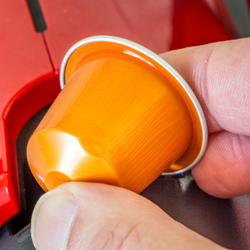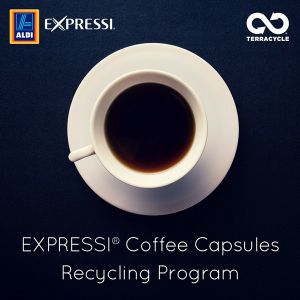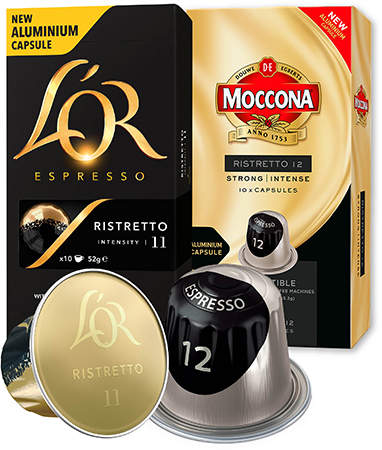These days, you’re probably more likely to see George Clooney brew a cup of coffee using his favourite Nespresso capsule than come across millennials armed with Macbooks and leather-bound journals at Starbucks. But with billions of aluminium and plastic coffee pods reportedly ending up in landfill every year, the taste might not be so sweet.
These hard-to-dispose products have even been claimed to take up to 500 years to break down. Fortunately, many brands are making sure that one person’s recycled trash is someone else’s repurposed treasure. In this article, we’ll be diving into how you should properly dispose of your recyclable coffee pods.
Jump to:
- Can I recycle coffee pods?
- Where to recycle coffee pods
- How to recycle ALDI coffee pods
- How to recycle L’OR coffee pods
- How to recycle Moccona coffee pods
- How to recycle Nescafe coffee pods
- How to recycle Nespresso coffee pods
Can I recycle coffee pods?
Coffee pods are recyclable, but not in the same way a water bottle is. While you can recycle coffee pods, you shouldn’t mix them in with the rest of your recycling, as coffee pods involve a foil lid that can contaminate the rest of the plastic. Let’s make it clear – coffee pods can be recycled, but coffee pods cannot go in the recycling bin.
Instead of treating your recyclable coffee pods like normal plastics, most of the time you need to dispose of them by mail. Further down the page, we’ve detailed how some coffee pod manufacturers prefer you to dispose of your used coffee pods, although if your brand is absent from this page, it’s worth looking for recycling information in your user manual. You can also check this information on the manufacturer’s website.
Where to recycle coffee pods
Currently, the only way to safely recycle coffee pods of any type is through drop-off and post-back collection schemes like those run by Terracycle. It’s worth noting that even coffee pods that are Certified Compostable can’t go in most home composts or organics bins.
Similarly, leftover coffee grounds can’t be disposed of in recycling bins since they are unable to take any organic material.
Don’t want to feel guilty about drinking pod coffee to help you grind through the day? You’re not the only one. According to Canstar Blue research, 28% of Australians prefer to use coffee pods that minimise their environmental footprint. Read our guide below to see how you can enjoy your favourite coffee without destroying the earth.
How are coffee pods bad for the environment?
Single-serve coffee pods are convenient and fairly affordable. Just put a pod in the machine, press a button, and voila! You’ve made a cup of Joe quicker than a barista can shout your name. No complicated tools and measurements, no waiting in line, and you can probably save a few bucks each month. But these small single-serve coffee pods are brewing a Venti-sized environmental problem.
Many brands use aluminium and mixed plastics to create the packaging for the portioned coffee. Each pod also includes other materials – such as a silicon ring and lacquer – although most of the outside build is recyclable aluminium. While these pods are technically recyclable, the non-biodegradable properties of these materials mean the products are harmful to the environment when not disposed of properly. Plus, it’s not just about the material that’s used to make coffee capsules. Our research shows 40% of survey respondents make coffee at home to avoid buying outside, with 25% of people generally buying the largest pack of pods. That’s a lot of coffee pods.
Shop Coffee Machines with some of our referral partners^
Should I use reusable coffee pods?
The best thing you can do for the environment is consume less, and one of the ways you can do this with a coffee pod machine is by using reusable coffee pods. Reusable coffee pods are available in Australia, typically from online retailers, and involve purchasing empty capsules which you fill up with provided coffee in seperate packaging.
Reusable coffee pods cut down on waste by making the only disposable element the packaging of the ground coffee, so you don’t need to use plastic coffee pods again. Before you purchase some reusable coffee pods, make sure you check if your machine can use the pods in question – there’s a fair chance they can’t, so it’s best to be certain.
Are aluminium coffee capsules recyclable?

Aluminium is a material typically used to create single-serve coffee pods. It can be recycled to create a variety of things like window frames, cars, and computers. Nespresso claims it’s “infinitely recyclable” and “the best material to protect the freshness, taste and quality” of the coffee grounds. The company also states the aluminium it uses does not require any unnecessary extra packaging to preserve the ” freshness and taste”.
However, the aluminium used to create each capsule is said to be too small for collection facilities to properly process because the recycling system is usually designed to handle larger items like bottles and cans. So, pods just end up filtering through and polluting the system. Aluminium also requires plenty of energy to make, making it even more important to reuse the material.
Are plastic coffee pods recyclable?
Plastic doesn’t exactly have a good reputation when it comes to the environment. Nespresso and Keurig, two of the world’s leading single-serve coffee manufacturers, have previously been roasted for using Plastic #7. This is a type of plastic material that’s hard to break down and could contain toxins. The two brands have now tried to change their environmentally non-friendly ways, by partnering with TerraCycle and providing a sustainable recycling program for customers.
For better recyclability, some companies use a plastic material known as polyethylene (PETE or PET). It’s commonly repurposed into things like storage containers, clothes, and sleeping bags.
However, plastic coffee pods are the same size as aluminium pods and can’t be recycled for the same reason. Most plastic pods come with a foil lid, which can contaminate the plastic stream during the recycling process. Many of the lids are also difficult to remove without a sharp knife.
What are coffee pod brands doing for the environment?
How are brands trying to prevent a dark and bitter end? Many brands in Australia such as Nespresso, L’OR, Moccona and Nescafe have teamed up with recycling and upcycling company TerraCycle to give these hard-to-dispose products a second life. Other brands like ALDI rely on its own sustainable recycling program.
However, these initiatives rely on customers to return their pods. Some brands like Nescafe reward customers for their good habits by giving points, or providing a small cash value to certain charities and non-profit organisations for each pod.
Shop Coffee Machines with some of our referral partners^
See our customer ratings:
Recyclable coffee pods
The heat is not just on brands to ensure coffee pods don’t end up in landfill. Here’s how you can pour in the effort and reduce your carbon footprint one recycled capsule at a time. It’s always better latte than never, right? See below to see a list of brands creating recyclable coffee capsules and ways you can safely throw away used pods.
How to recycle ALDI coffee pods
ALDI previously ran the Expressi Coffee Capsules Recycling Program in partnership with TerraCycle, transforming used Expressi capsules into recycled products. But after reaching maximum capacity sooner than expected, the initiative is no longer offered. Although the “socially responsible supermarket” is exploring options to expand its recycling program, ALDI has said it will update customers once the program has been finalised.
ALDI recommends you check with your local recycling authorities that your used pods are recyclable. Keep in mind that you must remove all the residue left in the pod before disposing of it.

How to recycle L’OR and Moccona coffee pods
L’OR and Moccona have partnered with TerraCycle to recycle their aluminium coffee capsules. The used pods are stored until there are enough pods to process the aluminium. The recyclable coffee pods are then cleaned and made into smaller pieces, melted down and recycled into new products.
You can send your used L’OR or Moccona coffee pods to TerraCycle, preferably in the cardboard box that you received the products in. Alternatively, you can use any box you have available, as long as it fits at least 200 pods (about 2kg worth). Each collection box must not include more than 70kg worth of capsules.
- Gather your empty L’OR or Moccona pods in a plastic bag to avoid any leakage, before placing them into the collection box. Make sure to seal the box and tape the shipping label, which you can find online. Then, arrange a pick up by calling the phone number contained in the email you received your label.
Unlike the ALDI Expressi capsules, these pods do not need to be thoroughly cleaned before being sent to recycling. The company states the coffee grounds will be separated and composted during the recycling process.

How to recycle NESCAFÉ coffee pods
Nescafe has also partnered with TerraCycle to help customers give a second life to its NESCAFÉ Dolce Gusto capsules. To recycle your used pods, sign up to the NESCAFÉ Dolce Gusto recycling program online. Collect your used capsules, place them in a plastic bag and put it in a collection box. Then, print the prepaid shipping label available online and tape it to the box, before dropping it to your local post office. For each coffee pod you send to TerraCycle, $0.02 will be donated to your chosen charity.
How to recycle Nespresso coffee pods
Nespresso prides itself on its “seed to sip” approach towards minimising the company’s environmental impact at each stage of the product life-cycle. The brand even claims that producing portioned coffee has helped the company reduce the carbon footprint of every cup of Nespresso coffee by 20%.
There are a few ways Nespresso encourages its customers to recycle your used aluminium coffee pods:
- Take the coffee pods to your nearest Nespresso Boutique.
- Drop off the pods at one of the 19,000 participating collection points across Australia.
- Post the capsules back to Nespresso using the prepaid Australia Post Recycling Satchel. The package is available to buy for $3, including the postage cost, and can fit up to 130 capsules.
- Dispose the capsules in the Nespresso Recycling box, which can be found in any workplace or community participating in Nespresso’s Nespresso bulk recycling program.


Share this article